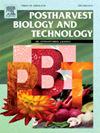Gypenoside GP5 通过激活自噬作用有效控制炭疽病真菌球孢子菌
IF 6.4
1区 农林科学
Q1 AGRONOMY
引用次数: 0
摘要
炭疽病是由 Colletotrichum spp.Colletotrichum gloeosporioides 是中国炭疽病的代表性病原菌。从牧野绞股蓝(Gynostemma pentaphyllum (Thunb.) Makino)中提取的绞股蓝苷 GP4-GP7 能显著抑制球孢子菌菌丝的生长,其 EC50 值分别为 96.98、27.5、38.48 和 61.59 mg L-1。这些化合物的抑制效果超过了常用的化学农药百菌清和植物源农药灭幼脲。其中,活性最强的化合物 GP5 对球孢子虫的孢子萌发和芽管伸长也有显著的抑制作用。此外,GP5 还能有效抑制采后水果炭疽病斑的扩散。透射电子显微镜和荧光显微镜表明,GP5 主要通过激活细胞自噬来发挥其抗真菌功能。此外,蛋白质组学分析表明,GP5 通过上调自噬相关蛋白 Atg8 的表达来增强细胞自噬,从而对球孢子菌产生抗真菌作用。这项研究为控制和管理球孢子菌炭疽病提供了一种新方法。因此,GP5 有可能被开发为植物源杀菌剂,用于炭疽病的生物防治。本文章由计算机程序翻译,如有差异,请以英文原文为准。
Gypenoside GP5 effectively controls Colletotrichum gloeosporioides, an anthracnose fungus, by activating autophagy
Anthracnose is a plant disease caused by Colletotrichum spp., known for its widespread infectivity and extreme destructiveness. Colletotrichum gloeosporioides is a representative pathogen of anthracnose in China. Gypenosides GP4-GP7, derived from Gynostemma pentaphyllum (Thunb.) Makino, could significantly inhibit the growth of C. gloeosporioides mycelial, with EC50 values of 96.98, 27.5, 38.48, and 61.59 mg L−1. The inhibitory effect of these compounds surpassed the commonly used chemical pesticide chlorothalonant and plant-derived pesticide matrine. Among them, the most active compound GP5 also showed a significant inhibitory effect on spore germination and bud tube elongation of C. gloeosporioides. In addition, GP5 could effectively suppress the spread of anthracnose spots in postharvest fruit. Transmission electron microscopy and fluorescence microscopy demonstrated that GP5 primarily exerted its antifungal function by activating cellular autophagy. Additionally, proteomics analysis revealed that GP5 had an antifungal effect against C. gloeosporioides by enhancing cellular autophagy through upregulation of the expression of the autophagy-related protein Atg8. This study presents a novel approach for the control and management of anthracnose in C. gloeosporioides. Consequently, GP5 has the potential to be developed as a plant-derived fungicide for the biological control of anthracnose.
求助全文
通过发布文献求助,成功后即可免费获取论文全文。
去求助
来源期刊

Postharvest Biology and Technology
农林科学-农艺学
CiteScore
12.00
自引率
11.40%
发文量
309
审稿时长
38 days
期刊介绍:
The journal is devoted exclusively to the publication of original papers, review articles and frontiers articles on biological and technological postharvest research. This includes the areas of postharvest storage, treatments and underpinning mechanisms, quality evaluation, packaging, handling and distribution of fresh horticultural crops including fruit, vegetables, flowers and nuts, but excluding grains, seeds and forages.
Papers reporting novel insights from fundamental and interdisciplinary research will be particularly encouraged. These disciplines include systems biology, bioinformatics, entomology, plant physiology, plant pathology, (bio)chemistry, engineering, modelling, and technologies for nondestructive testing.
Manuscripts on fresh food crops that will be further processed after postharvest storage, or on food processes beyond refrigeration, packaging and minimal processing will not be considered.
 求助内容:
求助内容: 应助结果提醒方式:
应助结果提醒方式:


